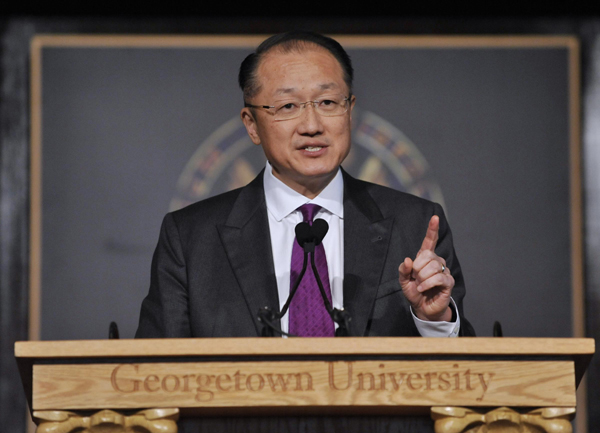World Bank seeks end to extreme poverty by 2030
Updated: 2013-04-03 14:29
(Xinhua)
|
|||||||||||
 |
|
World Bank President Jim Yong Kim delivers a speech at Georgetown University in Washington, capital of the United States, April 2, 2013. Kim called for global actions toward ending extreme poverty by 2030 and improving the lives of most vulnerable people in the developing countries. [Photo/Xinhua] |
WASHINGTON - World Bank President Jim Yong Kim Tuesday called for global actions toward ending extreme poverty by 2030 and improving the lives of most vulnerable people in the developing countries.
"Now is the time to commit to ending extreme poverty," Kim said in a speech at Georgetown University.
To reach the goal, the global extreme poverty rate will have to be brought below 3 percent by 2030, Kim said. It will change the nature of the poverty challenge "fundamentally" in most parts of the world and the focus then will "shift from broad structural measures to tackling sporadic poverty among specific vulnerable groups," he added.
"We are at an auspicious moment in history when the successes of past decades and an increasingly favorable economic outlook combine to give developing countries a chance - for the first time ever - to end poverty within a generation," Kim said in advance of the upcoming World Bank and International Monetary Fund in mid April in Washington.
The World Bank estimated in 2010 that about 21 percent of the global population, or 1.3 billion people, lived in extreme poverty - below the poverty line of $1.25 per day.
The World Bank chief said the 2030 goal relies on stronger economic growth, in particular sustained high growth in South Asia and Sub-Saharan Africa.
In addition, efforts to enhance inclusiveness and curb inequality are also required to ensure that growth translates into poverty reduction, most importantly through job creation, Kim said, calling for actions to boost the incomes of the poorest 40 percent of the population in developing countries.
"Ending extreme poverty by 2030 will demand national policies that aggressively focus on this goal, together with an accelerated and coordinated effort on the part of donors, the private sector, and civil society," Kim noted.
He said the World Bank will work with its partners to share knowledge on solutions to end poverty and promote shared prosperity. The World Bank's board will consider a new country strategy for India next week which aims at lifting an additional 300 million Indians out of extreme poverty over next several years.
Related Stories
Uncertainties remain for global food prices: WB 2013-03-28 12:55
WB welcomes establishment of BRICS development bank 2013-03-27 14:53
China pledges closer World Bank cooperation 2013-03-26 19:36
World Bank loans $620 million to China 2013-03-21 19:09
Today's Top News
Police continue manhunt for 2nd bombing suspect
H7N9 flu transmission studied
8% growth predicted for Q2
Nuke reactor gets foreign contract
First couple on Time's list of most influential
'Green' awareness levels drop in Beijing
Palace Museum spruces up
Trading channels 'need to broaden'
Hot Topics
Lunar probe , China growth forecasts, Emission rules get tougher, China seen through 'colored lens', International board,
Editor's Picks

|

|

|

|

|

|





